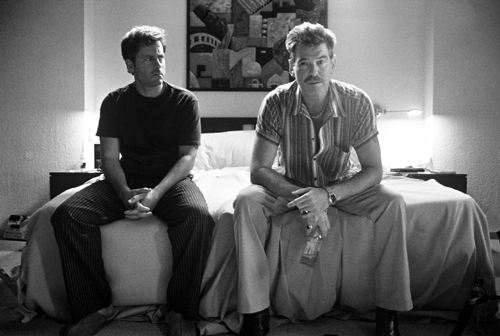By Steven Snyder
Julian Noble is one of the more gleefully detestable characters of recent cinema – one made that much funnier because he knows it, and doesn’t much care. Not since Billy Bob Thornton took a crude and vulgar turn in “Bad Santa” has a character piqued our interest so immediately and jerked around our emotions so completely. As played by Pierce Brosnan in a memorably complex and fractured performance, one gets the notion that not even Noble understands just who it is he wants to be.
“The Matador” is one of those movies that defies the rules and restrictions that dominate modern Hollywood. Now more than ever it has become an industry of formulas and marketing hooks, yet once in a while a film like “The Matador” comes along and rises above the mundane.
Take the first meeting between Noble and Danny Wright (Greg Kinnear), an unconventional chat in a hotel bar between two men who lack a single common interest. Noble is a bisexual philanderer, not opposed to paying for his companionship. Wright married his childhood sweetheart, and now lives in the burbs. Noble is drunk and depressed, nearing a low point that is nowhere near the bottom. Wright is celebrating the lucrative business contract he’s about to win, which will make him the savior of the day.
They have other differences too. Take, for example, their jobs. Wright is a suit-and-tie salesman. Noble is an assassin — a good assassin, but one who now has trouble killing people.
That these two meet is not entirely unexpected. That the film uses their differences to comedic effect is by no means surprising. But the way in which these two fully-realized characters butt heads and interact, the way they form not a friendship per se but an understanding, is inspired. Here is a film without a single predictable scene. That initial conversation at the bar, in any other film, would be used to establish the plot, create complications or push for sentiment. But in “The Matador,” it plays out as two guys – one drunk, one lucid – try to force awkward conversation until rudeness triumphs, and they storm away.
This game of back-and-forth is repeated time and again. Noble pushes too hard on Wright at a sidewalk cafe; Wright is skeptical of Noble’s visit to his suburban home; and ultimately Wright becomes Noble’s shoulder to cry on — and also his motivator — at a most unexpected climax during a horse race.
As the film playfully skips over a key scene, only to reveal it later, “The Matador” sleekly reveals that these two are not that different after all, and poses us with the question of what it would take for Wright to kill, and for Noble to stop.
So what the hell is “The Matador” anyway? The answer’s a little of this and a little of that, a true gem of scattered themes and intentions. It’s refreshing in all the ways that genre filler, like “Cheaper By The Dozen 2,” is not, and engaging in all the ways that formula retreads, like “Memoirs of a Geisha,” “Wolf Creek” and “Rumor Has It,” never even aspire to be. In a sea of Oscar posers, this is the surprise that demands a second viewing.
google_ad_client = “pub-6226499064891091”;
google_ad_width = 468;
google_ad_height = 60;
google_ad_format = “468x60_as”;
google_ad_channel =”0606561524″;
google_color_border = “336699”;
google_color_bg = “FFFFFF”;
google_color_link = “0000FF”;
google_color_url = “008000”;
google_color_text = “000000”;
//–>
src=”https://pagead2.googlesyndication.com/pagead/show_ads.js”>
WWW Downtown Express

































